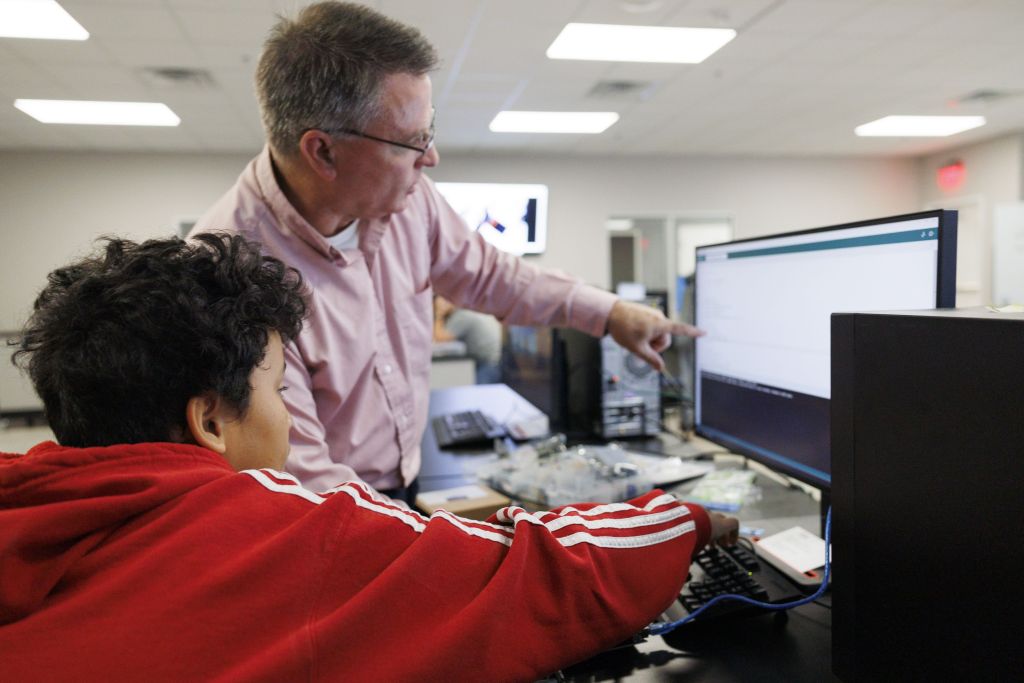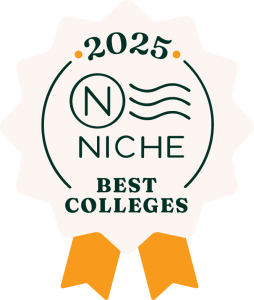
Associate of Science in STEM Mathematics
Gain Critical Knowledge and Analytical Expertise with an Associate Degree in Mathematics
Have you ever thought about measuring the spread of forest fires or oil spills? Do you think about ways to optimize systems or how to measure instantaneous rates of change? By studying mathematics and its applications, you can prepare to do this and much more! Equip yourself with tools to pursue a position in insurance, operations research, finance, or engineering. A great way to get started on the right track is to pursue an Associate of Science (AS) in Science, Technology, Engineering, and Mathematics (STEM).
Our associate’s degree in STEM Mathematics presents basic concepts and methods in modern mathematics to develop your ability to think critically and apply advanced concepts to various disciplines. A degree in mathematics helps show employers that you have the commitment, intelligence, and problem-solving skills necessary for a wide variety of potential career paths.
With the flexibility that our AS in STEM Mathematics offers, you can prepare for a dynamic future. Research opportunities are encouraged, and professors are willing to sit down with you and discuss research ideas or even help walk through math problems with you. What separates Liberty from the other schools is the way our professors truly believe in our mission of Training Champions for Christ.
Our AS in STEM Mathematics is designed to help you later pursue your BS in Mathematics or math and applied statistics degree. If you are more geared towards engineering or another discipline, you could potentially transfer your credits into another degree as well! Whichever path you choose, you can be confident that you are receiving a world-class STEM education.
Credit Hours
View CoursesNext start date: Aug 18, 2025

Liberty University is accredited by SACSCOC
Highlights
Highlights of Our STEM Mathematics Associate Degree Program
Prepare for Your Future in STEM
Our degree in STEM math can help prepare you for numerous careers in an ever-growing field.
Develop Valuable and Advanced Skills
You can develop advanced mathematical skills to help you pursue a future bachelor’s degree and work toward a financially rewarding occupation.
Hear From Experts With Real-World Experience
Our professors have real-life experience in the field and teach from a biblical worldview.
Professors Who Teach and Mentor You Directly
We are a teaching university, which means our professors are in the classroom working hands-on with you every week.
Career Potential
What Can You Do with Our Associate in STEM Mathematics?
Liberty University’s Associate in STEM Mathematics can help prepare you to pursue the following occupations:
- Bookkeeper
- Data analyst
- Engineering technician
- Logistics analyst
- Researcher
- Software development engineer
- Systems engineer


#4 Best College Campus in America
At Liberty, you’ll find an affordable, high-quality education designed to help equip students like you for the real world. Our commitment to excellence has earned us recognition as the #4 Best College Campus in America by Niche.com.
Earning your degree from a nonprofit university with state-of-the-art resources like ours can help set you apart from your peers.
Courses
What Will You Study in Our Associate Degree in STEM Mathematics?
Our associate degree in mathematics can help equip you with mathematical and computing training to be more competitive in today’s digitally advanced world. Throughout this degree, you can discover how to solve problems using appropriate mathematical, technological, and scientific methods.
Our mathematics degree is designed so that you can have an understanding of calculus I and II, with options to take classes like differential equations, linear algebra, or multivariable calculus.
The following are some of the specific topics you will explore in this degree:
- Computer ethics and algorithm design
- Differentiation of functions, series, limits, and advanced methods of integration
- Integration of polar coordinates, parameterization, and slope fields of differential equations
- Probability density functions
- Proof techniques and Boolean algebra
By majoring in STEM, you can feel confident in knowing that your degree program can help prepare you for a variety of STEM fields. If you hope to become an engineer, you may want to complete courses in linear algebra and differential equations. If you want to pursue a bachelor’s in math, you can take abstract algebra.
Featured AS in STEM Mathematics Courses
CSIS 110 – Introduction to Computer Sciences
MATH 131 – Calculus and Analytic Geometry I
MATH 132 – Calculus and Analytical Geometry II
MATH 211 – Introduction to Statistical Analysis
Degree Information
- This program falls under the College of Arts and Sciences
- View the Degree Completion Plan
- Check out our course catalog
- Transfer in up to 75% of the degree total
BENEFITS
Why Choose Liberty’s Associate Degree in STEM Mathematics?
Specialized Focus in Mathematics
If you choose to pursue your associate degree in STEM with a focus in mathematics, you will receive advanced mathematical training that many people have never experienced. Our STEM courses cover how to analyze and synthesize God’s design of the world and its reflection in mathematical and formulaic laws.
Supportive and Qualified Faculty
Our professors have years of experience in mathematics-related fields, so you can know that you are receiving a world-class education. These professors are also open to mentoring you and praying for you, and they want to help you succeed.
Exploring Your Career Path
Starting your academic journey with an associate degree is a great way to find your professional passions. While you complete mathematics courses, you will also take general education courses. This can help you decide which career field you want to pursue before committing to a specialized bachelor’s degree.
A Strong Foundation for the Future
Best of all, the credit hours you complete in this associate degree can potentially be used towards a bachelor’s degree with us! No matter the direction that God leads you, you can be confident in the education that you’re receiving.
Admissions
How Do You Become an Associate Degree in Mathematics Student?
Every application is reviewed by the admission committee on a case-by-case basis, meaning there are no set minimums for acceptance. However, all applicants must submit the following documents* for admission:
- Admission application
- Official high school transcripts
- Official college transcripts (if applicable)
- Admission essay
Results from the CLT, SAT, or ACT are not required for admission, but may be used in consideration for merit-based aid.
*Note that additional documentation may be requested by the admission committee after your application has been received.

Have Questions?
We’ll make sure you have the information you need to take your next step.